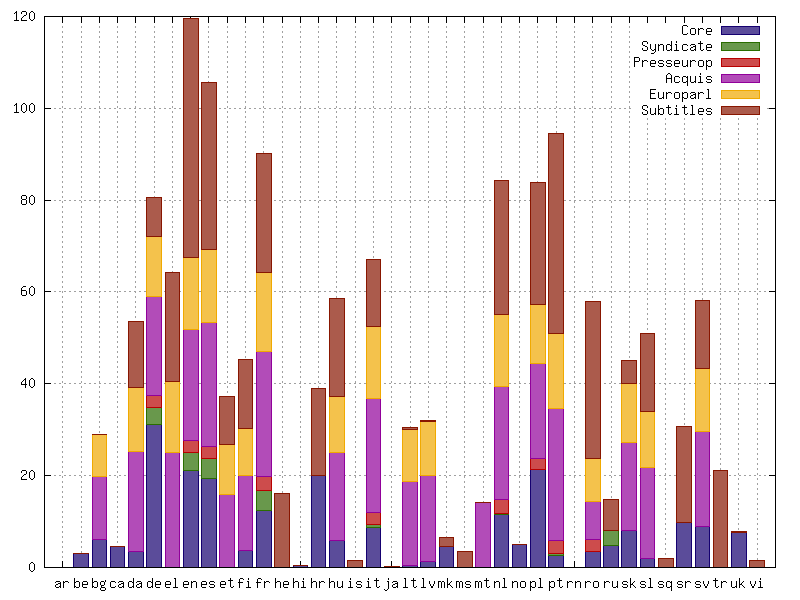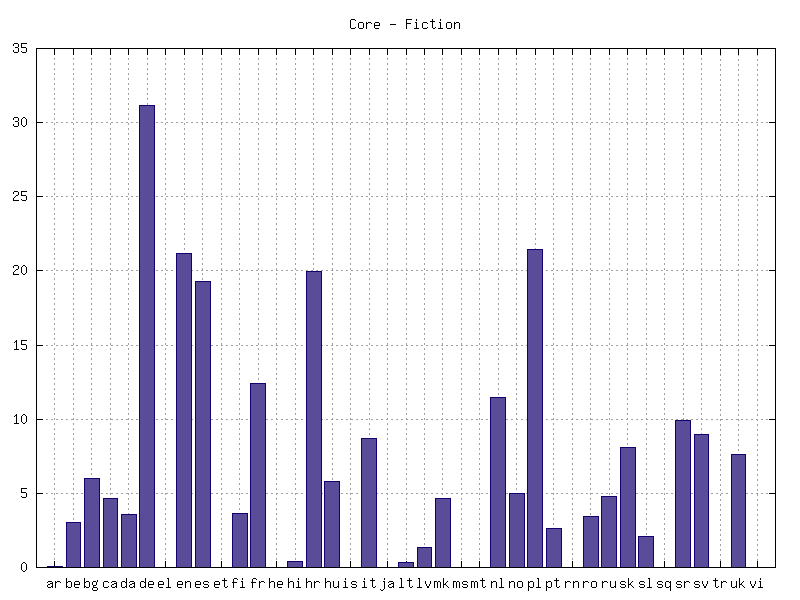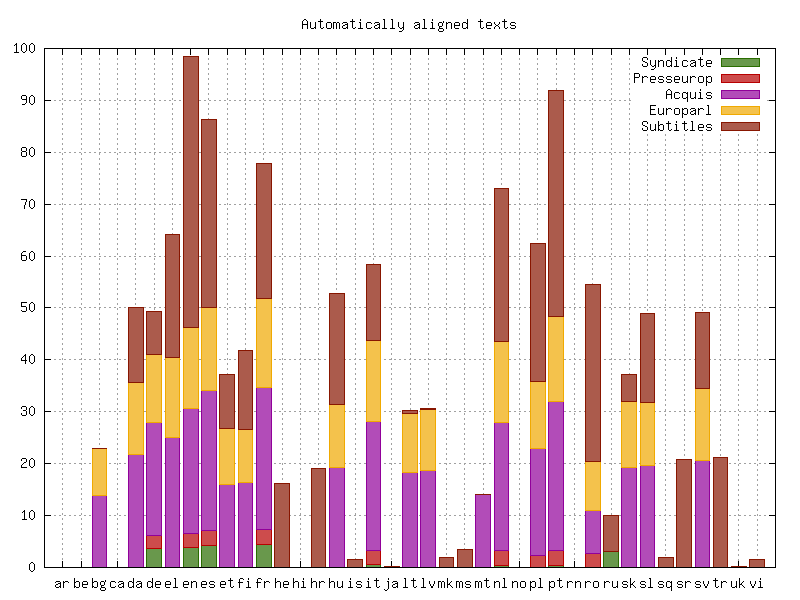InterCorp Release 9
| Name | Czech – core | Czech – collections | other – core | other – collections | |
|---|---|---|---|---|---|
| Positions | Number of tokens | 120,443,181 | 117,981,673 | 278,445,878 | 1,556,840,965 |
| Number of word forms | 96,956,714 | 89,645,545 | 231,501,606 | 1,228,896,294 | |
| Structural attributes | Number of documents | 1430 | 5 | 2,934 | 89 |
| Number of div | 1,430 | 111,263 | 2,934 | 1,849,184 | |
| Number of sentences | 8,308,814 | 13,588,082 | 17,210,601 | 143,478,514 | |
| Further information | reference | YES | |||
| representative | NO | ||||
| publication date | 2016 | ||||
| foreign languages | 39 | ||||
| tagged languages | 23 | ||||
| lemmatized languages | 20 | ||||
Access to the texts
After registration the corpus can be searched using a web interface. The registration is valid for all ICNC corpora with public access. If you already have a user name and password for the Czech part of the Czech National Corpus, you do not need to register for the parallel corpus.
InterCorp can be accessed via a standard web browser from the integrated search interface of the Czech National Corpus KonText. A tutorial is available in Czech and a brief summary also in English.
After signing a non-profit licence agreement, texts from InterCorp can also be acquired as bilingual files including shuffled pairs of sentences. Please contact us at the address below if you are interested.
New release of InterCorp is usually published once per year. With each new release, its size, possibly also the number of languages and the extent and quality of annotation may grow. Previous versions remain available (starting with release 6).
References
If you publish results based on InterCorp we would appreciate a link to the project site www.korpus.cz/intercorp. In your scientific publications please cite the following paper:
Čermák, F., Rosen, A. (2012). The case of InterCorp, a multilingual parallel corpus. International Journal of Corpus Linguistics. Vol. 13, no. 3, p. 411–427 (bibtex, electronic edition at ingentaConnect, preprint version).
For more references see the repository of bibliographical items based on the CNC. All references to work using InterCorp are welcome. See here for details.
When citing a specific part of InterCorp please use the reference displayed in KonText in the corpus description, e.g. as:
Rosen, A., Vavřín, M.: Korpus InterCorp – English, German1), version 7 of 19 Dec 2014. Institute of the Czech National Corpus, Charles University, Prague 2014. Available on-line: http://www.korpus.cz
Texts in the corpus
The core of InterCorp consists mostly of fiction, manually aligned. Intercorp offers also a selection of fully automatically processed texts, so-called collections. The choice in the present release includes:
- Political commentaries published by Project Syndicate and VoxEurop (formerly PressEurop)
- A package of legal texts of the European Union form the Acquis Communautaire corpus
- Proceedings of the European Parliament dated 2007–2011 from the Europarl corpus
- Film subtitles from the Open Subtitles database
These texts have been aligned automatically: search results may include a higher number of misaligned segments. Morevore, the collections do not retain all texts from the original resource. This includes texts that have no Czech counterpart. Some texts from the Acquis Communautaire and Europarl corpora have been partially corrected or omitted – as a result, they may differ in form or size if compared with the original source. A similar selection was applied to the Open Subtitles database, where – as an additional reduction – only a single translation was selected per title and language. On the other hand, some metadata items missing in the original resource but detectable from context or other sources have been added.
Each text has a Czech counterpart. As a result, Czech is the pivot language: for every text there is a single Czech version (original or translation), aligned with one or more foreign-language versions. The total size of the available part of InterCorp in release 9 from July 2016 is 231 mil. words in the aligned foreign language texts in the core part and 1,228 mil. words in the collections (see Version history). The share of the core and the collections in the corpus can be seen in the following charts. The charts show the volumes in millions of words.
Corpus size in thousands of words
| Language | Core | Syndicate | Presseurop | Acquis | Europarl | Subtitles | Total | |
|---|---|---|---|---|---|---|---|---|
| ar | Arabic | 34 | 0 | 0 | 0 | 0 | 0 | 34 |
| be | Belarusian | 3,025 | 0 | 0 | 0 | 0 | 0 | 3,025 |
| bg | Bulgarian | 6,007 | 0 | 0 | 13,816 | 9,083 | 0 | 28,907 |
| ca | Catalan | 4,632 | 0 | 0 | 0 | 0 | 0 | 4,632 |
| da | Danish | 3,556 | 0 | 0 | 21,679 | 13,915 | 14,429 | 53,581 |
| de | German | 31,168 | 3,725 | 2,482 | 21,723 | 13,089 | 8,366 | 80,556 |
| el | Greek | 0 | 0 | 0 | 25,069 | 15,403 | 23,714 | 64,187 |
| en | English | 21,208 | 3,818 | 2,670 | 24,207 | 15,580 | 52,101 | 119,586 |
| es | Spanish | 19,310 | 4,324 | 2,816 | 27,001 | 15,885 | 36,378 | 105,716 |
| et | Estonian | 0 | 0 | 0 | 15,962 | 10,899 | 10,296 | 37,158 |
| fi | Finnish | 3,645 | 0 | 0 | 16,455 | 10,175 | 15,097 | 45,373 |
| fr | French | 12,406 | 4,393 | 2,928 | 27,351 | 17,178 | 25,961 | 90,219 |
| he | Hebrew | 0 | 0 | 0 | 0 | 0 | 16,221 | 16,221 |
| hi | Hindu | 408 | 0 | 0 | 0 | 0 | 0 | 408 |
| hr | Croatian | 19,980 | 0 | 0 | 0 | 0 | 19,042 | 39 023 |
| hu | Hungarian | 5,818 | 0 | 0 | 19,176 | 12,306 | 21,239 | 58,541 |
| is | Icelandic | 0 | 0 | 0 | 0 | 0 | 1,584 | 1,584 |
| it | Italian | 8,694 | 651 | 2,707 | 24,849 | 15,489 | 14,653 | 67,046 |
| ja | Japanese | 0 | 0 | 0 | 0 | 0 | 113 | 113 |
| lt | Lithuanian | 358 | 0 | 0 | 18,392 | 11,212 | 557 | 30,521 |
| lv | Latvian | 1,666 | 0 | 0 | 24,667 | 13,895 | 381 | 40,609 |
| mk | Macedonian | 4,663 | 0 | 0 | 0 | 0 | 1,877 | 6,540 |
| ms | Malay | 0 | 0 | 0 | 0 | 0 | 3,520 | 3,520 |
| mt | Maltese | 0 | 0 | 0 | 14,133 | 0 | 0 | 14,133 |
| nl | Dutch | 11,444 | 314 | 2,955 | 24,746 | 15,563 | 29,362 | 84,386 |
| no | Norwegian | 4,965 | 0 | 0 | 0 | 0 | 0 | 4,965 |
| pl | Polish | 21,433 | 0 | 2,378 | 20,627 | 12, | 26,572 | 83,822 |
| pt | Portuguese | 2,605 | 369 | 2,999 | 28,602 | 16,484 | 43,391 | 94,454 |
| rn | Romani | 5 | 0 | 0 | 0 | 0 | 0 | 5 |
| ro | Romanian | 3,432 | 0 | 2,737 | 8,199 | 9,446 | 34,128 | 57,944 |
| ru | Russian | 4,788 | 3,174 | 0 | 0 | 0 | 6,885 | 14,848 |
| sk | Slovak | 8,066 | 0 | 0 | 19,222 | 12,734 | 5,134 | 45,158 |
| sl | Slovenian | 2,057 | 0 | 0 | 19,645 | 12,240 | 17,024 | 50,968 |
| sq | Albanian | 0 | 0 | 0 | 0 | 0 | 2,003 | 2,003 |
| sr | Serbian | 9,886 | 0 | 0 | 0 | 0 | 20,720 | 30,607 |
| sv | Swedish | 8,959 | 0 | 0 | 20,585 | 13,840 | 14,693 | 58,079 |
| tr | Turkish | 0 | 0 | 0 | 0 | 0 | 21,190 | 21,190 |
| uk | Ukrainian | 7,597 | 0 | 0 | 0 | 0 | 246 | 7,843 |
| vi | Vietnamese | 0 | 0 | 0 | 0 | 0 | 1,473 | 1,473 |
| Subtotal | 231,501 | 20,769 | 24,676 | 430,160 | 265,022 | 488,266 | 1,460,397 | |
| cs | Czech | 96,956 | 3,416 | 2,315 | 20,303 | 12,922 | 50,688 | 186,602 |
| TOTAL | 328,458 | 24,186 | 26,991 | 450,463 | 277,945 | 538,954 | 1,647,000 | |
N.B.: Each Czech text is counted only once, even though it may have more than one foreign counterpart.
Morphosyntactic annotation
Texts in the following languages have received some morphosyntactic annotation.
Queries including contracted forms into tagged or lemmatized texts may fail. This includes forms such as can't or I'm, which are split by the tagger into two parts (ca+n't and I+'m) with corresponding lemmas and tags. Similarly with Polish forms byłam or gdybyś (była+m and gdyby+ś). Tokenization may even introduce errors: gdzie ś za Wisłą. In this context, gdzieś is not a contraction. A query intended to find the whole contracted form should be typed in as a Phrase, with the split parts separated by a space. Only the individual parts of the contracted form are assigned a tag and a lemma.
Morphological tags including characters with a special meaning in regular expressions, e.g. “$” in the English tag “wp$”, must be preceded in queries by a backslash: tag=“wp\$”.
Structural attributes
| Structure | Attribute | Description | Values |
|---|---|---|---|
| doc | doc.id | unique document identifier | text |
| doc.lang | language | ar / be / bg / ca / cs / da / de / el / en / es / et / fi / fr / he / hi / hr / hu / is / it / ja / lt / lv / mk / ms / mt / nb / nl / no / pl / pt / rn / ro / ru / sk / sl / sq / sr / sv / sy / tr / uk / vi / zh | |
| doc.version | version | number | |
| doc.wordcount | document size in words | number | |
| div | div.id | text identification | author's_last_name-shortened_title / _ACQUIS / _EUROPARL / _PRESSEUROP / _SUBTITLES / _SYNDICATE |
| div.group | division in | Core / Acquis / Europarl / PressEurop / Subtitles / Syndicate | |
| div.wordcount | number of words | number | |
| div.author | author | last name, first name | |
| div.title | full title | text | |
| div.publisher | publisher | text | |
| div.pubplace | publication place | text | |
| div.pubyear | publication year | date | |
| div.txtype | text type | discussions - transcripts / drama / fiction / journalism - commentaries / journalism - news / legal texts / nonfiction / other / poetry / subtitles | |
| div.original | is the text an original? | Yes / No | |
| div.srclang | language of the original | ar / as / az / be / bg / bl / bn / bo / bs / bt / ca / cr / cs / ct / cz / da / de / dk / eb / el / en / es / et / eu / fa / fi / fr / ga / gr / he / hi / hr / hu / hy / id / ie / is / it / ja / ka / ko / ku / lt / lv / mk / mn / ms / mt / my / ni / nl / no / pl / po / ps / pt / rm / rn / ro / ru / se / sk / sl / sq / sr / sv / ta / th / ti / tl / tr / tu / uk / un / ur / vi / zh | |
| div.translator | translator | last name, first name | |
| div.transsex | translator's gender | F / M | |
| div.authsex | author's gender | F / M | |
| p | p.id | unique paragraph identifier | text |
| s | s.id | unique sentence identifier | text |
Acknowledgements
We are grateful for the possibility to use the following texts and software:
Texts:
- Fiction in many Slavic and some other languages from ASPAC – Amsterdam Slavic Parallel Aligned Corpus – with special thanks to Adrian Barentsen
- Political commentaries in a number of languages from the site Project Syndicate
- Newspaper texts in a number of languages from the Presseurop/VoxEurop server
- Legal texts in EU languages from the JRC-ACQUIS corpus
- Proceedings of the European Parliament from the EuroParl corpus
- Slovak-Czech concordances from the Slovak National Corpus
- Short stories in a number of languages My 1989 from Goethe Institut
- A number of texts in the Czech-Lithuanian section of the corpus and Jiří Levý's The Art of Translation in more languages – with special thanks to Patrick Corness
- George Orwell's novel 1984 in a number of languages from the Multext-East corpus
- Ukrainian and Polish texts from the PolUkr corpus
- Film subtitles from the database Open Subtitles
Pre-processing
- Parallel text editor InterText by Pavel Vondřička
- Aligner Hunalign
- Sentence splitter for Czech by Pavel Květoň
- Sentence splitter for Norwegian by Jarle Ebeling and Pavel Vondřička
- Sentence splitter Punkt for all other languages from Natural Language Toolkit
Taggers/lemmatizers:
- TreeTagger for Bulgarian, Dutch, English, Estonian (thanks to Helmut Schmid), French, Italian, Portuguese (thanks to Pablo Gamallo), Russian and Spanish
- HunPOS for Hungarian and other languages
- Tagger for Slovak (thanks to Radovan Garabík)
- Tagger for Lithuanian (thanks to Vidas Daudaravičius and Hana Skoumalová)
- Tagger for Norwegian (thanks to Pavel Vondřička)
- totale for Slovene (thanks to Tomaž Erjavec)
- RFTagger for German
- OMorFi+HunPOS for Finnish (thanks to Filip Ginter)
- Stagger and IceStagger for Swedish and Icelandic (thanks to Robert Östling)
- RelDI tagger for Croatian and Serbian (thanks to Nikola Ljubešić)
- LVTagger for Latvian (thanks to Pēteris Paikens and Michal Škrabal)


